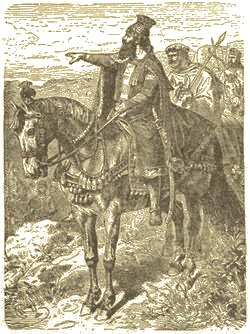Cyrus the Great, born around 600 or 576 BCE, was the founder of the Achaemenid Empire, the first Persian Empire, and one of history's most remarkable leaders. His reign, which began in 559 BCE, marked the beginning of an era characterized by vast conquests, enlightened governance, and significant cultural achievements.
 Cyrus's early life is shrouded in legend, but he rose to power by uniting the Persian tribes and overthrowing the Median Empire, establishing his dominance in the region. His military campaigns were both strategic and bold, leading to the conquest of Lydia in 546 BCE and Babylon in 539 BCE. The capture of Babylon was particularly notable for its relatively peaceful approach; Cyrus entered the city without significant conflict and was welcomed as a liberator.
Cyrus's early life is shrouded in legend, but he rose to power by uniting the Persian tribes and overthrowing the Median Empire, establishing his dominance in the region. His military campaigns were both strategic and bold, leading to the conquest of Lydia in 546 BCE and Babylon in 539 BCE. The capture of Babylon was particularly notable for its relatively peaceful approach; Cyrus entered the city without significant conflict and was welcomed as a liberator.
Cyrus is celebrated not only for his military successes but also for his enlightened approach to governance. He respected the customs and religions of the lands he conquered, a policy that earned him loyalty and stability across his empire. The Cyrus Cylinder, often regarded as the first declaration of human rights, exemplifies his forward-thinking leadership. It proclaimed the freedom of worship and the return of displaced peoples, including the Jews who were allowed to return to Jerusalem and rebuild their temple.
Under Cyrus's rule, the Achaemenid Empire became the largest empire the world had seen, stretching from the Indus Valley in the east to the Aegean Sea in the west. His innovative administrative practices, such as the use of satraps (governors) to oversee different regions, created a model of governance that balanced central authority with local autonomy.
Cyrus the Great died in 530 BCE, but his legacy endures as a model of effective and humane leadership. He is remembered not only as a great conqueror but also as a ruler who valued justice, cultural diversity, and the well-being of his subjects.
|
 Cyrus's early life is shrouded in legend, but he rose to power by uniting the Persian tribes and overthrowing the Median Empire, establishing his dominance in the region. His military campaigns were both strategic and bold, leading to the conquest of Lydia in 546 BCE and Babylon in 539 BCE. The capture of Babylon was particularly notable for its relatively peaceful approach; Cyrus entered the city without significant conflict and was welcomed as a liberator.
Cyrus's early life is shrouded in legend, but he rose to power by uniting the Persian tribes and overthrowing the Median Empire, establishing his dominance in the region. His military campaigns were both strategic and bold, leading to the conquest of Lydia in 546 BCE and Babylon in 539 BCE. The capture of Babylon was particularly notable for its relatively peaceful approach; Cyrus entered the city without significant conflict and was welcomed as a liberator.








